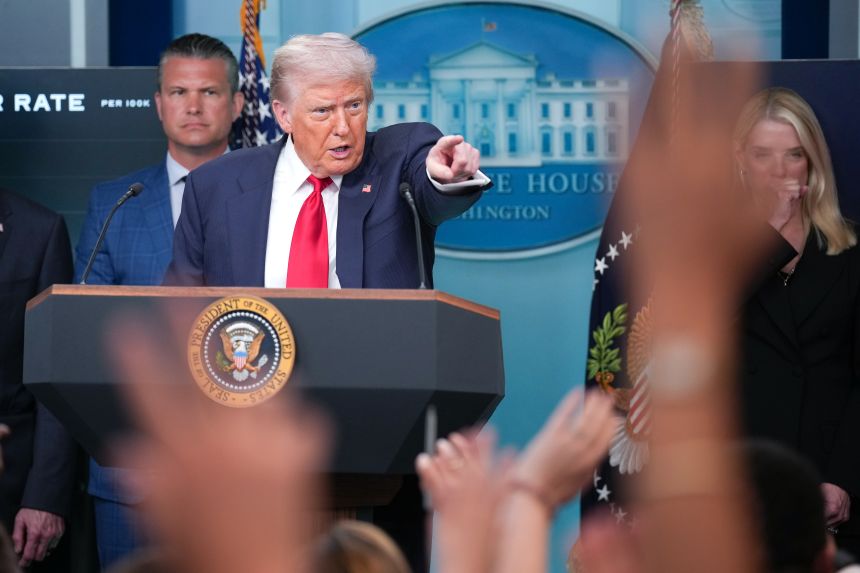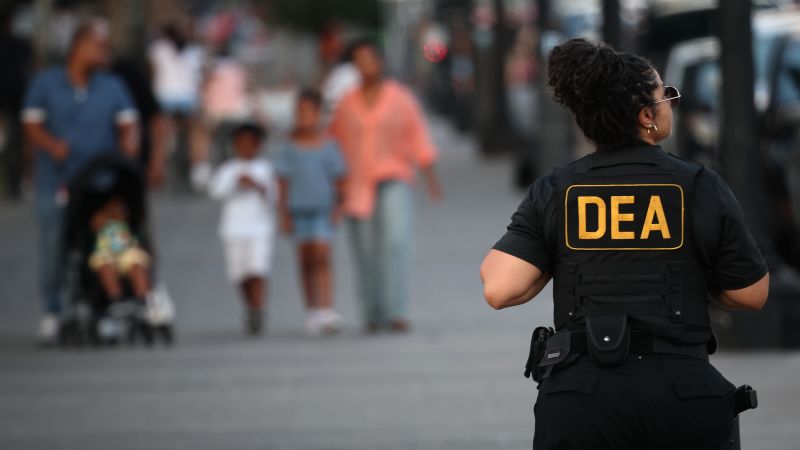In his first term, President Donald Trump spun alternative realities. In his second, he’s making everyone live in them.
Trump conjured his most dystopian vision yet of a crime-ridden American inner city to justify his emergency federal takeover of Washington, DC’s police department and to order National Guard troops onto the streets.
“Our capital city has been overtaken by violent gangs and bloodthirsty criminals, roving mobs of wild youth, drugged-out maniacs and homeless people,” Trump said in a macho news conference in the White House Briefing Room on Monday.
Everyone inside the Beltway would like to feel safer, and the capital has law-and-order challenges like many other major cities. But Trump’s hellish depiction contradicted data showing carjackings, gun crimes and homicides are all down over the past two years, with DC Mayor Muriel Bowser claiming violent crime is at 30-year lows.
The gap between Trump’s sulfurous rhetoric and day-to-day life in most of Washington undercut his dubious claims of a crisis. The president has made a habit of using the capital as a stage for his military flexing.
Emergencies are also in the eye of the beholder.
“When we think of emergencies, it usually involves surges in crime, or crime that is not being responsive, or tools that we have that we cannot use in the normal course — that’s when we use an emergency,” Bowser said.
Trump’s pseudo-emergency in the nation’s capital is far from his first. This year, he’s declared national emergencies on the economy, energy and the border to unlock extraordinary executive branch powers.
But there is no economic emergency: Trade deficits existed for decades, and the US recovered from the pandemic better than other developed nations. This hardly represent the sudden crisis he’s used to seize tariff power away from Congress.
America doesn’t face an energy emergency, either — but Trump’s invocation unleashed new drilling and prospecting rules. Meanwhile, the president justifies hardline deportation policies by claiming America is under an invasion of criminals and terrorists — a hair-raising exaggeration, even if border enforcement was lax for parts of the Biden administration.
Trump’s Washington, DC, crackdown sits well within another trend of an increasingly authoritarian second term — his desire to militarize civilian functions of the government and law enforcement. He sent thousands of active-duty troops to the southern border. He deployed National Guard troops and US Marines to Los Angeles after unrest over immigration raids.
Using the military in policing roles is a device familiar from totalitarian states, where the first act of a dictator is usually to send troops onto the streets of the capital. Members of the National Capital Region congressional delegation, all Democrats, warned Monday of “a soft launch of authoritarianism” after Trump’s announcement.
Trump’s call for extreme solutions that only a strongman like him can provide is the kind of extremism that worried the Founders more than 250 years ago. Alexander Hamilton wrote in Federalist 1, for instance, that history showed leaders who overthrew liberty did so by “commencing demagogues, and ending tyrants.”
Trump claimed in his first convention address in 2016 that “I alone can fix it.” And while he often evoked questionable crises in his first term, and used a so-called national emergency to fund his border wall, the president’s zeal for action is far more developed in his second. The last seven months have seen Trump repeatedly mining for untapped seams of presidential power and then wielding it in Washington, across the country and around the world.
Bowser adopted a strategically calm response to Trump’s assumption of power over her city — which was largely compliant, at least if it remains temporary, with the capital’s home rule ordinances. She acknowledged, however, that his power play was “unsettling and unprecedented.”
It’s rather more than that, when taken alongside Trump’s earlier power grabs. In just the last week or two, these include the use of the Justice Department to go after Obama administration officials; an attempt to create five new GOP House seats in a mid-cycle Texas redistricting effort; the firing of a top government statistician because he didn’t like unemployment figures; and the use of massive tariffs to punish Brazil over its prosecution of his populist friend former President Jair Bolsonaro, who allegedly tried to overthrow the country’s 2022 election. In an earlier age, America punished those who threatened democracy, not the ones who held them accountable.
But as always with Trump, it’s worth sifting the sizzle from the substance.
Hyperbolic warnings of looming tyranny that circulate all day on liberal media programs — whatever Trump does — don’t really help voters understand what is going on. America is still far from being a police state such as China. Still, the president’s remark that it was “embarrassing” that he had to talk about the “unsafe” and “dirty” and “disgusting” US capital before seeing Vladimir Putin on Friday was jarring. His implication was that there would be no issue if he had dictatorial powers like the Russian president.
But sometimes Trump’s announcements have more bite than his actions. And it’s not impossible that his press conference on Monday was just a massive public relations stunt.
His comment that police officers are now “allowed to do whatever the hell they want” were catnip for his MAGA base and are likely to fuel days of approving coverage on conservative media. Defense Secretary Pete Hegseth has been heavily criticized in six months heading the Pentagon, but the former Fox News anchor was picked to fire off ballistic soundbites. He stood at Trump’s right shoulder and vowed that the troops sent to Washington would be “strong, they will be tough, and they will stand with their law enforcement partners.”

To Trump’s left, Attorney General Pam Bondi and FBI chief Kash Patel stood together, encapsulating another obvious goal of Trump’s announcement: distracting from a MAGA media meltdown over their failure to release files on accused sex trafficker Jeffrey Epstein they hyped on the campaign trail but have since kept hidden, fueling claims they’ve been co-opted by a corrupt deep state.
Barring altercations between federal agents and troops and suspects in Washington, DC, the deployments could also replicate the experience of Los Angeles, when the federalized military units were dispatched to a torrent of Trump’s firebrand rhetoric but quietly withdrawn a few weeks later.
Polls show many Americans are skeptical about the use of troops on American soil — especially to quell protests.
But Trump’s gambit wouldn’t be possible if the capital was totally peaceful. Heart-rending stories about shooting victims are horribly familiar in the Metro pages of the Washington Post and on local news. Residents of some of the district’s most troubled neighborhoods might view boots on the ground positively. And DC Police Union Chairman Greggory Pemberton told Fox News that his members agree with Trump that crime is out of control in the city and that “something needs to be done.”
Trump’s gamble is also a neat political trick. Democrats who oppose it can be lambasted as weak on crime. Critics might cite statistics showing drops in crime. But Trump understands this is an emotive rather than an intellectual issue that can be politically curated with bloodcurdling rhetoric.
Los Angeles Mayor Karen Bass, whom Trump defied by deploying National Guard troops and Marines to the city, warned that in a democratic society, law enforcement problems should never need military solutions.
“I believed then, as I believe now, that Los Angeles was a test case. I think DC is a test case as well,” Bass told CNN’s Kasie Hunt, warning that Trump’s move in the capital could be a precursor for illegal power grabs to come.
“The president (can) say, ‘Well we can take over your city whenever we want and I am the commander in chief and I can use the troops whenever we want.’ I think that is an abuse of our troops, and I think it is an overreach of presidential powers.”
